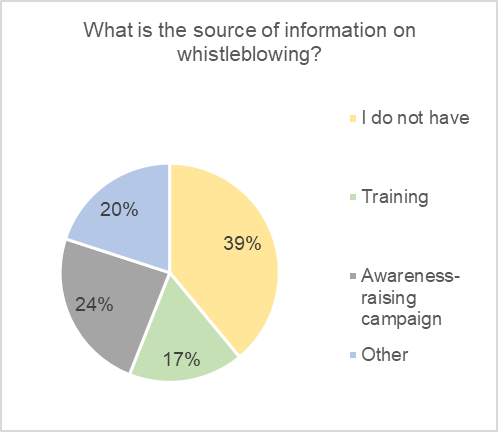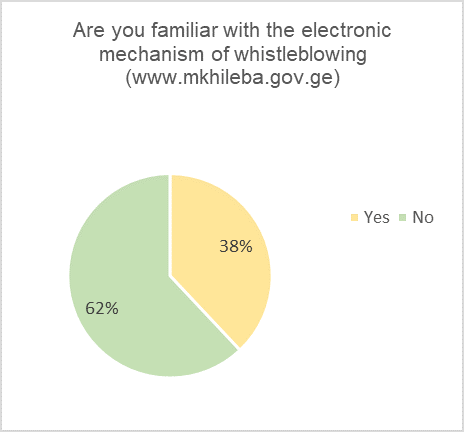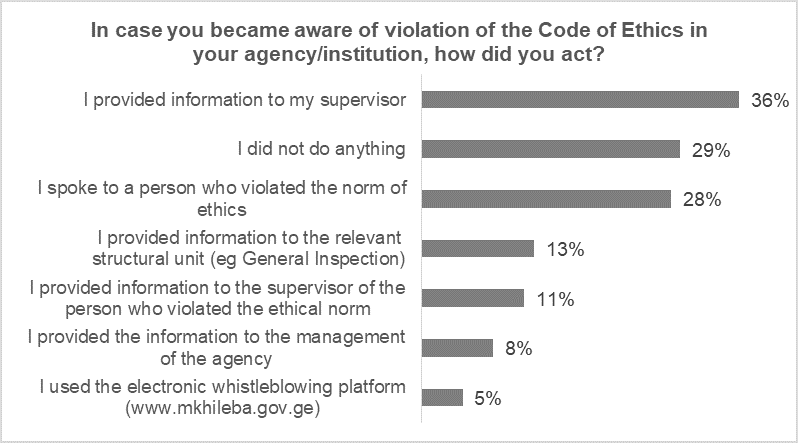


In the survey carried out by IDFI in 2020, to the question about the sources of civil servants' information about the whistleblowing institution during the quantitative survey, 39% of the respondents stated that they did not have any information, 24% named an awareness-raising campaign as a source of information, 20% - relevant training, and 17% named other sources on their own initiative during the survey, mostly related to their work process and legislation.


It is noteworthy that 62% of the respondents were not aware of the electronic whistleblowing mechanism (www.mkhileba.gov.ge).
According to the results of the quantitative survey, 29% of the civil servants who became aware of a specific fact of violation of ethical norms did not respond at all. In the case of 25% of respondents, the response was limited to speaking to the person who violated the norm of ethics.

Effective steps need to be taken to address the gaps and challenges identified by the research, namely:
- Revision of the Georgian legislation on whistleblowing to bring it in line with international standards, including regulation of the issue by a separate legislative act, establishment of a coordinating body (independent anti-corruption agency/state inspector), removal of the barrier for public disclosure, establishment of a unified standard of internal mechanisms and procedures, development of special legislation for law enforcement agencies.
- Application of the legislative norms on whistleblowing to the private sector.
- Study of the need for the establishment of an independent anti-corruption agency by the Government of Georgia through active consultation with civil society and field experts.
- Adoption of the rule and methodology for registration of whistleblowing statements for public agencies by the Government of Georgia.
- Raising awareness of whistleblowing mechanisms among civil servants, including the electronic platform, as well as whistleblower protection mechanisms by the Government of Georgia, the Civil Service Bureau, and relevant public institutions through training, information clips, brochures, and other awareness-raising activities.
- Study of the whistleblowing institution issue for its promotion by the Government of Georgia, including in order to impose sanctions in case of harassment of the whistleblower, to determine the rule of compensation for the damage caused to the whistleblower, and to define possible cases of rewarding the whistleblower.
- Encouragement of the use of the electronic portal of whistleblowing by the Civil Service Bureau, regular update and analysis of the data on the portal, proactive publication of the processed data, possibility of creating an electronic account of an anonymous whistleblower, introduction of mandatory feedback on disclosure statements (including anonymous) submitted through the electronic portal, providing hotline for consultation etc.
- Adoption of codes of ethics by public agencies, inclusion of issues related to whistleblowing in them, elaboration of disclosure response procedures, and ensuring employee awareness of these.
- Clear expression of the attitude towards the institution of whistleblowing by the management of public institutions, and ensuring constant encouragement of disclosure among the employees.
____

This material has been financed by the Swedish International Development Cooperation Agency, Sida. Responsibility for the content rests entirely with the creator. Sida does not necessarily share the expressed views and interpretations.